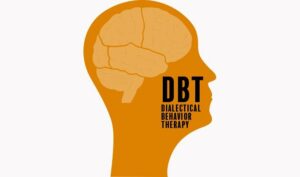Anger is an emotion that is natural and healthy, but it can also be destructive when uncontrolled. Fortunately, there are many ways to manage anger effectively. One popular form of therapy is Dialectical Behavior Therapy (DBT), which is known for its effectiveness in managing emotions. In this blog post, we will explore the basics of DBT and how it can be applied to Anger Management. We will discuss the steps of DBT, as well as examples of how it can be used in anger management therapy.
Contents
What is DBT?

DBT is a form of Cognitive-Behavioral Therapy that was developed specifically to treat people with anger problems. DBT uses a combination of cognitive and behavioral techniques to help people learn how to identify and change thoughts that contribute to anger, as well as develop new ways of coping with anger.
This therapy is very structured and consists of four main modules: Mindfulness, Distress Tolerance, Emotion Regulation, and Interpersonal Effectiveness. Each module focuses on different areas with the ultimate goal of helping individuals to become more mindful of their emotions and find better ways to regulate them effectively.
How is DBT Applied to Anger Management?
The goals of DBT for Anger Management are to help individuals understand and manage their anger more adaptively, as well as to identify the triggers that cause them to become angry.
A key component of DBT is learning how to recognize emotions and respond appropriately. This means that individuals learn how to identify when they are starting to feel angry, and what triggered the anger, and then they can take the appropriate steps to calm down or manage the emotion more beneficially.
DBT also focuses on problem-solving skills, which can be applied to situations that trigger anger. This helps individuals learn how to recognize potential issues before they become emotionally charged, thus enabling them to handle situations more effectively.
Additionally, DBT teaches individuals how to regulate their emotional responses. This includes learning how to recognize when emotions are escalating and taking the necessary steps to calm down or manage the emotion more beneficially.
Finally, DBT encourages mindfulness, which is an important part of managing anger. Mindfulness means being aware of one’s thoughts, feelings, and actions without judging them. Through mindfulness, individuals can learn to observe their anger rather than react to it in unhealthy ways.
Who Can Benefit From DBT?

DBT is a treatment for anger management that is effective in treating a variety of issues related to anger.
- Chronic Anger: People who have chronic anger often have difficulty controlling their temper and tend to lash out in response to minor provocations. In addition, chronic anger can lead to other health problems, such as higher rates of heart disease and stroke.
- Occasional Intense Anger: Individuals may experience occasional intense anger which can be debilitating and lead to ruinous consequences. Individuals who experience occasional intense anger may struggle with tasks that require focus or reasoning (such as driving or working) and may find it difficult to socialize or relax.
- Managing Anger: Managing one’s emotions is an important part of preventing angry behaviors from escalating into full-blown conflicts, which can have negative consequences for both the individual and others around them. DBT can help individuals learn how to identify and understand their thoughts and feelings, as well as the thoughts and emotions of others.
How Does DBT For Anger Management Work?
DBT for Anger Management is a type of therapy that focuses on managing anger. It is based on the theory that anger is a response to triggers, and can help overcome emotional difficulties.
DBT for Anger Management typically involves weekly sessions with a therapist and helps patients learn to identify and manage their anger in healthy ways. Patients are taught how to identify and deal with their emotions, as well as how to confront and resolve conflicts without resorting to anger.
In the sessions of DBT for Anger Management, patients learn coping skills – such as deep breathing and mindfulness techniques – to manage their emotions. The therapist may also assign homework assignments, such as keeping an anger diary or engaging in role-playing activities.
By using DBT for Anger Management, individuals can learn how to effectively express their feelings healthily and develop healthier coping mechanisms to handle difficult situations.
Techniques of DBT For Anger Managment

Anger is a normal stress reaction and can be enjoyable when it’s expressed in appropriate ways. Unfortunately, anger that’s not managed can lead to problems in relationships, work, and other areas of life.
Several different techniques can be used to manage anger. Some of these are:
Cognitive Restructuring
One type of cognitive restructuring used in Dialectical Behavior Therapy (DBT) is called “Opposite Action”. This technique helps people think about their anger differently and change their behavior. With the help of a therapist, individuals can practice shifting away from destructive behaviors and toward constructive ones.
Mindfulness
Another DBT technique for managing anger is mindfulness. This technique helps people become aware of their thoughts, feelings, and actions in the present moment. Individuals can practice recognizing when they start to feel angry and learn to respond more appropriately.
Distress Tolerance
Finally, another DBT approach for managing anger is distress tolerance. This technique involves helping individuals accept their current emotional state and focus on strategies for managing their feelings without engaging in destructive behaviors. Strategies may include relaxation and distraction techniques, such as guided visualization or breathing exercises.
Interpersonal Effectiveness
In addition to the above techniques, another technique used in DBT for anger management is interpersonal effectiveness. This skill helps people communicate effectively and assertively with others without becoming aggressive or disrespectful. Through this skill, individuals can learn to express their feelings and needs in a way that will be heard and respected by others.
Using a combination of these DBT techniques can help individuals learn to manage their anger more effectively.
Tips For Using DBT For Anger Management

To use DBT for anger management, start by understanding your anger. Anger is typically a response to an event or situation that feels threatening or overwhelming. It’s important to understand why you’re angry and what makes the anger feel threatening.
There are many tips and resources available to help you with using DBT for anger management.
- You may find it helpful to talk to a therapist who specializes in DBT or to attend a support group where you can learn more about the techniques discussed here.
- With guidance and practice, these techniques can help you better manage your anger and lead a healthier, happier life.
- You can also practice these techniques at home by setting aside time to practice mindfulness and distress tolerance, as well as using cognitive restructuring in challenging situations.
- By consistently practicing these techniques, you can learn to recognize and respond appropriately to your anger before it gets out of control.
Conclusion
There is no one-size-fits-all answer to anger management, and what works for one person may not work for another. However, the cognitive behavioral therapy (CBT) approach of DBT can be extremely effective in helping people learn how to manage their anger and improve their overall mood. CBT teaches individuals specific skills for recognizing and responding to thoughts that lead to anger, changing unhealthy behaviors that contribute to Anger, and building better relationships with others. If you are interested in learning more about DBT or want to find a therapist who can help you begin using this approach, please visit our website or talk with your doctor about it.
For more information and guidance, please contact MantraCare. Anxiety is a common mental health condition characterized by persistent feelings of worry, fear, and apprehension. If you have any queries regarding Online AnxietyCounseling experienced therapists at MantraCare can help: Book a trial Anxiety therapy session


